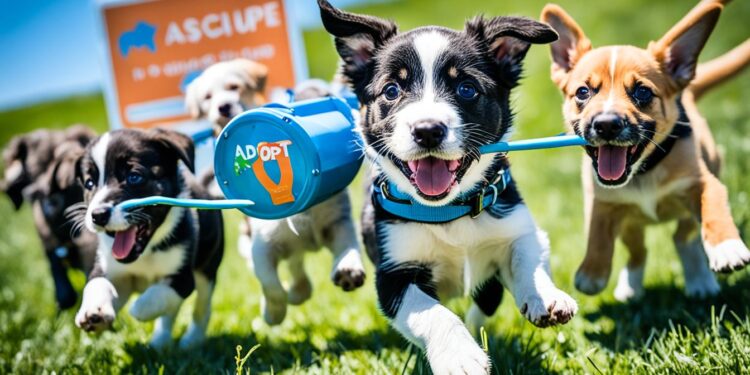Rescue Puppies: Starting a New Life with Love

Have you ever wondered what it takes to help a rescue puppy thrive in their new life? How can you ensure they feel safe, loved, and comfortable in their new home? The journey of welcoming a rescue puppy into your life is a special one, filled with challenges and rewards. Let me guide you through the process of getting your new furry friend adjusted and creating a strong bond that will last a lifetime.
When rescuing a puppy, it’s important to remember that they may come with a unique set of needs and emotions. The first few days, weeks, and months are crucial in helping them decompress and settle into their new environment. The 3-3-3 rule can serve as your compass during this journey, providing guidance for the first 3 days, 3 weeks, and 3 months of their new life with you.
To prepare for their arrival, it’s essential to dog-proof your home and ensure their safety. Take the time to walk your property, checking for any potential escape routes. It’s also beneficial to create a designated quiet space or invest in a crate where they can retreat to when they need some alone time.
Equipping yourself with the necessary supplies is another crucial step. From a collar and leash to food and water bowls, and of course, toys to keep them entertained, having everything ready will make their transition smoother.
Building a strong relationship with your rescue dog requires effective communication and the establishment of a leader-follower dynamic. When bringing your new dog home, remember to remain calm and take them for a walk to drain any excess energy. Introduce them to each room while maintaining your role as the leader.
Understanding the importance of boundaries and routines in the early stages will help your rescue dog feel secure and reduce anxiety. With time, patience, and lots of love, your new puppy will blossom into a cherished companion.
The Deep Bond: What It Means to Love a Rescue Dog
Bringing a rescue dog into your life can deepen your relationship and create a strong bond. Many people experience a profound sense of love and attachment to their rescue dogs, treating them as family members. The process of caring for and nurturing a rescue dog can transform a romantic relationship into a partnership where both partners work together to provide love and care for the dog.
Conversations begin to revolve around the dog’s well-being, and decisions are made with the dog’s needs in mind. This shared responsibility strengthens the bond between the couple as they navigate the challenges and joys of raising a rescue dog together. Through their mutual love and dedication, the couple develops a deeper understanding of each other, fostering a more intimate and connected relationship.
It is important to note, however, that this deep attachment can also create anxiety about what would happen if the couple were to break up. Sharing custody of a dog after a breakup can be complicated and emotional, as the dog becomes a point of contention and a reminder of the past relationship.
To illustrate the impact of a breakup on a shared rescue dog, consider the following scenario:
| Scenario | Pros | Cons |
|---|---|---|
| The couple agrees to share custody of the rescue dog. | – The dog can continue to receive love and care from both owners. – The dog maintains a connection to both owners, preserving familiarity and stability. |
– Coordinating schedules and logistics for shared custody can be challenging and time-consuming. – Potential conflicts and disagreements may arise regarding the dog’s routine and care. – The dog may experience separation anxiety when transitioning between homes. |
| One owner assumes full custody of the rescue dog. | – Simplifies logistics and eliminates potential conflicts related to shared custody. – Provides stability for the dog by residing in one consistent environment. |
– The owner who does not have custody may experience sadness and loss. – The dog may miss the absent owner and struggle with the transition. |
This scenario illustrates the challenges and considerations when sharing custody of a rescue dog after a breakup. It is essential for individuals contemplating adopting a rescue dog to have open and honest conversations about their expectations in the event of a relationship ending.
In conclusion, the deep bond formed by loving a rescue dog can greatly enhance a couple’s relationship. However, it is crucial to be aware of the potential challenges and emotional complexities that may arise in the event of a breakup. By having open communication and considering all possible outcomes, individuals can make informed decisions and ensure the well-being of their beloved rescue dog.
Loving Unconditionally: Can You Love Another Dog as Much as the First?
Many people wonder if they can love a second dog as much as their first. The experience of loving a dog is unique for each individual, and every relationship with a dog is different. While it is natural to worry about whether the love for a second dog will compare to the love for the first, it is important to remember that love is not a finite resource that needs to be divided.
Love multiplies and expands with each soul that is loved. Each dog has its own unique traits and qualities that are cherished, and every relationship teaches new depths of love. Adopting a second dog can bring joy and companionship to both the dogs and the owners, creating a new dynamic within the family. While the love for each dog may be different, it is equally significant and cherished.
Canine companionship is a special bond that transcends the number of dogs in one’s life. The capacity to love is not limited by the presence of another dog. In fact, having a second dog can enhance the overall experience of owning a pet, providing even more opportunities for love, connection, and shared experiences. Each dog, whether it is the first or the second, brings something unique to the relationship and contributes to the happiness and fulfillment of their human companions.
So, if you find yourself considering adding a second dog to your family, know that the love you have for your first dog will not diminish. Instead, it will expand to encompass the new addition as you embrace the capacity to love multiple dogs and experience the joys of canine companionship on a deeper level.






